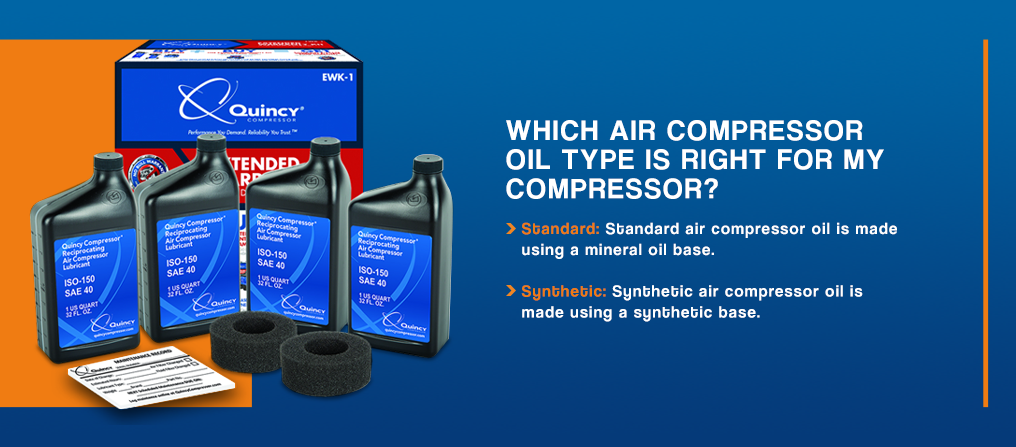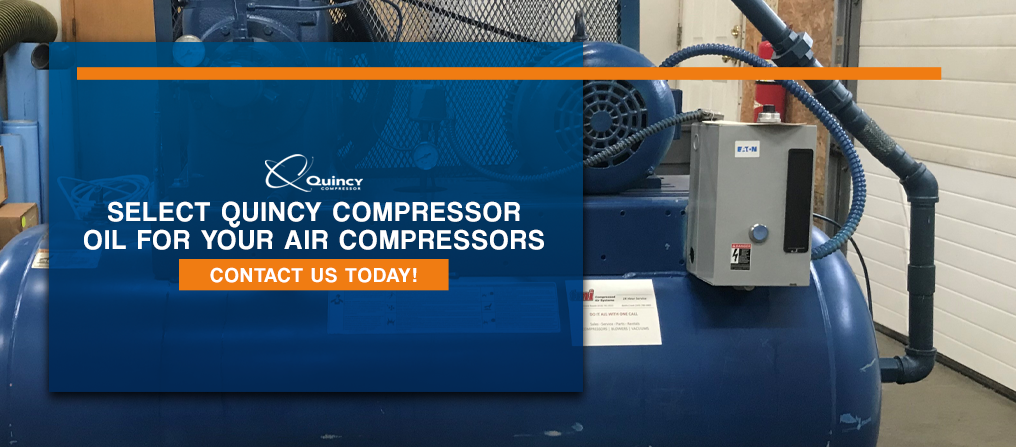Just as cars require a specific type and grade of oil for optimal performance, so do air compressors. Using the right oil for your air compressor will benefit your machine in various ways, including reducing energy consumption, decreasing friction between different motor components and maximizing the compressor’s life span.
Below, we’ll talk about what makes air compressor oil unique and which type is the best air compressor oil for your application.
What Is Air Compressor Oil?
Air compressor oil is a specialized lubricant used to prevent premature wear and tear in air compressors. It can be one of two types — natural or synthetic — and it also varies in terms of its viscosity and the additives it contains. It differs significantly from motor oil in that it has less sulfur and carbon and does not contain any detergent.
In addition to the lubrication these oils provide, they also offer numerous other benefits for air compressor use, including:
- Heat absorption: Air compressor oil absorbs the heat produced from compressed air, thereby keeping the compressor at a cooler temperature.
- Oxidation resistance: Air compressor oil contains additives that delay the oxidation process and acid formation.
- Longer life span: The additives in air compressor oil also increase the lubricant’s lifetime, protect machine components when on standby and make the lubricant compatible with a wide variety of conditions.
- Viscosity in cold temperatures: Although some oils fail to do their job once the temperature drops, air compressor oil maintains its viscosity even when it’s cold.
- Demulsification: Air compressor oil also contains additives designed to improve water separation, which will protect the compressor from water and oil emulsions. This makes it easier for the oleophilic bags to capture the oil later on.
- Anti-foaming abilities: When big air bubbles rise to the oil’s surface, foam is produced. This increases oxidation because it exposes more of the oil’s surface to oxygen. Without anti-foaming additives, the oil separators would be saturated by the foam and the air compressor’s life span would decrease. This is because saturated oil separators create a pressure drop, which leads to more energy consumption.

Which Air Compressor Oil Type Is Right for My Compressor?
Standard and synthetic are the two basic types of air compressor oil, and each has distinctive characteristics:
- Standard: Standard air compressor oil is made using a mineral oil base. This oil is cheaper than synthetic and is recommended for homeowners or those who don’t use their compressors continuously. It’s also a good choice for compressors that only do light- or medium-duty work.
- Synthetic: Synthetic air compressor oil is made using a synthetic base. This oil undergoes lots of processing, and, as a result, it is more refined than standard oil. If you’re a professional who uses your compressor at least three times a week, synthetic oil is the way to go. Synthetic oil will allow your compressor to run more quietly and smoothly. It will also protect it from overheating. The overall temperature range of synthetic oil is also wider.
While reciprocating and rotary screw models can run with various kinds of oil products, manufacturers often recommend that you use synthetic oils, as they contain no sulfur or additives that can lead to unwanted buildup on valves.
The main benefits of synthetic oils for rotary screw air compressors include:
- Longer life span: A synthetic oil can extend the life of your rotary screw air compressor by an impressive 8,000 hours.
- Fewer deposits: Synthetic oils reduce deposits such as varnish and sludge that lead to premature wear and tear and negatively affect your compressor’s performance.
- Cooler temperatures: Synthetic oils stay cooler during compressor operation and produce an air discharge of a lower temperature.
- Less oil consumption: Synthetic oils are often consumed at a slower rate, meaning you won’t have to add oil as often.
Reciprocating air compressors can also benefit from synthetic oil in the following ways:
- Less accumulation of carbon: Synthetic oil reduces how much carbon accumulates on the valves and significantly reduces feed rates.
- Safer operation: The auto-ignition temperatures and flashpoints are also higher for synthetic oils.
- Extended lifetime: A synthetic oil can also help prevent packings and piston rings from wearing out prematurely.
Substitutes for Air Compressor Oils
If you are unable to use an oil made specifically for air compressors, there are some acceptable alternatives:
- Hydraulic oil: Hydraulic oil possesses multiple qualities that make it an acceptable substitute for air compressor oils. It has a lower viscosity in colder temperatures, which means it can flow more freely given its low density. For this reason, hydraulic oil works best when temperatures are lower. Hydraulic oils don’t experience oxidation, either, which can keep your compressor from rusting.
- Automatic transmission fluid: Automatic transmission fluid (ATF) is primarily used in car transmissions, but some kinds can also be used in air compressors. This fluid offers several benefits — it reduces wear and tear, resists breakdowns and cools down components. Compressors can produce a lot of heat when running, so ATF can ensure the compressor works efficiently without any shutdowns due to overheating. However, most ATFs do not work with compressors and may even cause damage.
- Motor oil: Motor oil contains certain detergents that can benefit the internal combustion engine. However, these detergents can also quickly cause excessive carbon buildup, which can be harmful. For this reason, your oil should be non-detergent motor oil if you’re going to use this substance.
As you can see, there are three potentially viable substitutes for compressor oil. If you want to maximize your compressor’s life span and performance, then we strongly recommend you use air compressor oil — ideally one recommended by your manufacturer.
Oil Changing Frequency for Air Compressors
How often you should replace the oil in your compressor generally depends on the kind of machine you have. Check the user’s manual that came with your compressor, which should provide detailed information on air compressor oil specifications.
If this information is not provided, use the following guidelines as a reference — rotary screw compressors need oil changes every 7,000 to 8,000 hours of use, and reciprocating air compressors ideally need oil changes every three months. However, regardless of use, the oil should be changed once per year at the very least to ensure smooth operation and a long-lasting life span.
FAQs Regarding Air Compressor Oil
To ensure you select the right oil for your unique air compressor, we have answers to a few common questions about the different air compressor oil types.
What Kind of Oil Should I Use for My Air Compressor?
Many people question what oil to use in their air compressor, often wondering whether there’s a better option available. The best oil to use in an air compressor will often depend on the manufacturer’s recommendations. Typically, your compressor guidelines will specify which oil would work best to ensure peak performance. The manufacturer’s recommendations should also tell you if synthetic blends will work for a specific air compressor.
You want to abide by the compressor manufacturer’s warranty guidelines. Non-specified oil substitutes like motor oil could void the warranty and eliminate any added perks. The manufacturer can trust compressor oil to be formulated specifically for air compressors. The same cannot be said of other oil types, even if they are technically a viable replacement. Whether standard, synthetic or a substitute, the oil you use must be non-detergent.
If your warranty guidelines don’t specify a type of oil, we recommend using a standard 20 weight or 30 weight compressor oil. A 30 weight oil is more viscous and will provide better protection in the warmer months. While 30 weight oil is more effective at coating the parts, it can become too thick to use if the temperature drops too low. A 20 weight oil will work a lot better in cold environments to ensure the compressor starts up and runs when needed.
How Does Motor Oil Compare to Air Compressor Oil?
When comparing motor oil versus air compressor oil, the most significant difference stems from what the oil is formulated to do. Compressor oil is designed specifically for air compressors. Meanwhile, most motor oil is not formulated with air compressors as the intended use.
Can you use motor oil in air compressors? The short answer is no. The motor oil used in your car or truck typically includes detergent, which is beneficial for internal combustion engines but can be harmful to air compressors. If you want to use motor oil in your air compressor, you must perform additional research to ensure that the motor oil you purchase is non-detergent. Otherwise, the detergent will quickly produce carbon buildup in your air compressor.
In a bind, non-detergent motor oil can be a viable substitute. However, most people don’t keep this type of motor oil on hand for their vehicles, so this substitution adds minimal convenience. Furthermore, the difference in cost between compressor oil and other oil types is relatively small. You would do better to stock a compressor oil that is specifically made for your air compressor instead.
Do All Air Compressors Require Oil?
You are only required to add oil to the engine if you have an oil-lubricated compressor. Oil-free air compressors do not require oil since they are already coated and sealed straight from the factory.
Generally, oil-lubricated air compressors handle higher-duty cycles and have an extended engine life over oil-free models. Oil-free compressors don’t last as long because there is no way to add more oil to them when the lubrication eventually wears off. Most oil-lubricated air compressors also run quieter than oil-free models — another reason why most factories, workshops and other industrial use-cases choose air compressors that require oil.
Select Quincy Compressor Oil for Your Air Compressors
To keep your air compressor operating at maximum efficiency with minimal wear and tear, there’s nothing better than oil from Quincy Compressor. If you’re interested in investigating your options, learn more about our oil products for more information on which air compressor oil type is right for you, or browse the wide selection of air compressors on our site.
Last Updated on October 26, 2021 at 3:45 pm


